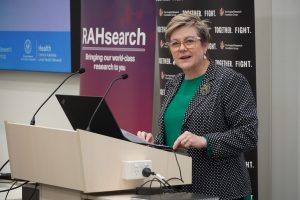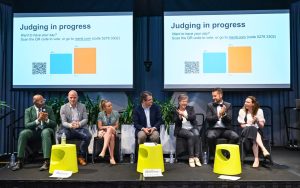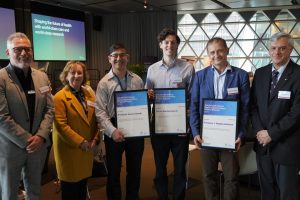Three ground-breaking collaborations led by Central Adelaide Local Health Network (CALHN) researchers have been awarded significant grant funding with the aim of improving outcomes for people experiencing acute heart attacks, remote and regional patients with diabetes-related foot disease and those recovering from major bowel surgery.
The innovative hospital-based projects will each receive grants of $200,000 over two years, as part of the CALHN CEO Clinical Rapid Implementation Project Scheme, also known as CRIPS grants.
CALHN CEO Professor Lesley Dwyer said the CRIPS grants, now in its third year, allowed researchers to continue their work exploring pioneering projects that will improve our health service delivery aligned with our strategic ambitions.
“The CRIPS grants support staff based at The Queen Elizabeth Hospital and the Royal Adelaide Hospital to conduct research that will assist to improve health service delivery whilst delivering new treatments and improving patient care,” Professor Dwyer said.
“As an academic focused health organisation, research is at the forefront of our minds and I look forward to our researchers reporting back on their work and delivering improved outcomes for patients and for our network,” she said.
The successful projects are:
- The STEMI app – the development of real time smart technologies to manage acute heart attack patients: Associate Professor Chris Zeitz, Head of Unit TQEH Cardiology
- Enhanced recovery protocol for patients undergoing colorectal surgery – earlier return of bowel function to reduce complications after major bowel surgery: Associate Professor Ryash Vather, Consultant Surgeon
- Integrating telehealth for diabetes-related foot disease – Establishing telehealth for rural and remote patients to reduce amputation rates, improve wound healing, and reduce hospital admission: Professor Robert Fitridge, Consultant Vascular Surgeon
The STEMI app
Suspected heart attacks are a common medical emergency, where timely management is vital for positive health outcomes.
A/Prof Zeitz said early, seamless access to expert opinion is essential to overcoming delays in diagnosis and treatment.
“The STEMI app is a real time, virtual network that aims to reduce harm and save lives for people experiencing heart attacks,” he said.
The app will instantly connect an interventional cardiologist with paramedics or emergency staff caring for patients with a possible heart attack, to facilitate rapid diagnosis and management.
The virtual network will be used to view electrocardiographs, communicate patient demographics and vital statistics, connect clinicians and assemble emergency teams. “This will significantly reduce the time from first medical contact to diagnosis, improve diagnostic accuracy, and reduce time from diagnosis to successful treatment,” A/Prof Zeitz said.
Enhanced recovery protocol for patients undergoing colorectal surgery
Delays in the return of bowel function is a common complication for patients who have undergone major bowel surgery, also impacting their length of hospital stay, says A/Prof Ryash Vather.
Providing an oral medication, pyridostigmine, to patients after surgery could achieve a 20% lower mortality rate, along with reduced healthcare costs and length of stays in hospital.
“If the study proves successful it is likely to be incorporated into routine surgical care for bowel surgery patients, with the potential to extend to other surgical specialties,” he said.
Integrating telehealth for diabetes-related foot disease
Diabetes-related foot disease is among the main causes of hospital admission in Australia, also responsible for about 70% of non-traumatic amputations nationally. These impacts are especially felt by patients in rural and remote populations, including Aboriginal people, because of delays in diagnosis and treatment.
Prof Robert Fitridge says his grant will be looking to use telehealth to improve access for patients to enable more rapid diagnosis, leading to fewer hospital admissions and reducing the amount of people needing to undergo amputation.
“This will be chiefly achieved through employing a Podiatrist Telehealth Coordinator to organise contact, provide expert advice and education, and coordinate evidence-based multidisciplinary care pathways to relevant communities and health care providers,” he said.
An Aboriginal Health Practitioner will ensure continuity-of-care for Aboriginal people included in the program, with a pilot study focused on Aboriginal patients already underway.
CALHN is currently supporting 1481 ongoing research studies and 683 ongoing clinical trials, including 522 at the RAH and 161 at TQEH. There are 765 ongoing health and medical research studies underway, with 552 taking place at the RAH and 163 and based at TQEH.



